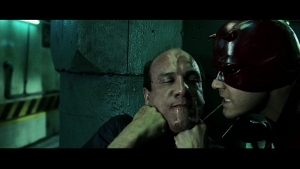
I hate to admit this, but there’s a sad, small part of me trapped down in the basement of my mind that wants very much to like Daredevil. But what does that whinny little bastard know? I’m in charge here, and I say the film’s a mess. It’s an interesting mess with decent color sense and the occasional flair for high drama…but so are most of the drunken artists staggering home through every major city on any given night of the week.
Really, Daredevil is a case history in everything that can go wrong with film – any film, regardless of genre. Writer/director Mark Steven Johnson tried to get this made back in 1997, but Marvel Comics’ bankruptcy, the collapse of the Batman and Superman franchises, and a widespread public disregard for superheros kept Daredevil in development hell until the turn of the millennium (or Willennium, as we said at the time).
Then a little film called X-Men finally escaped the same purgatory. Sudden floodgates of money spewed into Marvel’s doors as studios fell all over themselves to buy up comic book “properties.” Fox snatched up the Man Without Fear and immediately hobbled Johnson with three mutually exclusive conditions: make the movie quickly for an absurdly small sum, and do no worse than a PG-13.
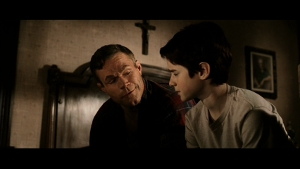
In the sixty minute documentary accompanying this film’s theatrical edition DVD (and justifying your purchase of same all by itself), influential comic book writer/artist Frank Miller calls Daredevil “the poor man’s Spider-Man.” Since I love disagreeing with Frank Miller, I’ll describe the past twenty years of Daredevil comics (since Miller’s time on the title) as “the R-rated Spider-Man.” With more ninjas and noir sensibilities Miller used to great effect, helping to revolutionize modern superhero comics before a massive overdoses of noir drove Miller insane, creating several shambling atrocities.
I name check Miller because, without his run on Daredevil‘s books, this movie wouldn’t exist and the character would still be a B-lister. For many, this problematic, inconsistent little film only cemented that reputation…which is just sad when you think about it. This might’ve been a good movie…or at least a memorable one. If it weren’t for that pesky, wall-crawling kid and his syrupy, sentimental bullshit.
Unfortunately, Spider-Man‘s success drove the studio to demand Johnson cut a full half hour out of Daredevil and beef up the gratuitous special effects shots. Daredevil‘s most obvious problems flow from these dunderheaded decisions. Thankfully, even the superior director’s cut throws plenty of cudgels at my feet, allowing me to give the film a thorough, justified beating.
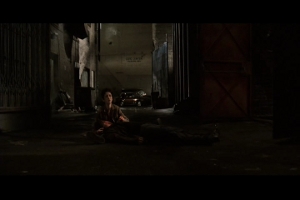
For one thing, we start off with Our Hero (Ben Affleck) literally falling into church, bleeding from wounds we won’t see him suffer for another hour and change. The local padre calls Our Hero by his first name and cradles him in his arms, triggering both an expository voice over (the first Shade of Spider-Man) and a flashback sequence.
Matt Murdock is a native Hell’s Kitchen, the crime ridden hive of scum and villainy southwest of Manhattan’s Central Park, just past the theater district. One day, Matt took the wrong shortcut home from school and (in a typical, mid-60s Stan Lee Twist) witnessed his washed-up prizefighter father – Jack “The Devil” Murdock – shaking someone down for mob protection money. Disillusioned, Matt tore off through a loading dock specializing exclusively in toxic waste. One careless forklift driver is all it takes to complete the origin sequence.
Oh horrible industrial accidents, where would the Marvel Universe be without you? Devoid of heroes, that’s where. But as Frank Miller points out, Daredevil is unique in that he’s the only superhero known for what he can’t do. Blinded by the accident, young Matt discovers the ability to combine his remaining senses – their acuity enhanced by whatever burnt out his retinas – into a kind of hypersight. It’s like echolocation but weirder, since it also gives Matt the power to selectively negate laws of physics that might get in the way of being awesome. And the ability to spontaneously transform into an unconvincing CGI simulacrum of himself.
All of which would be tragic enough, but it’s not the Defining Element of Tragedy you (or the Joker) would expect. That comes when Matt’s father – having reformed and gotten back into the ring – refuses to throw a fight. The newly-blinded Matt comes across his father’s corpse in an alleyway and swears eternal Vengeance on Crime. Never seen that before
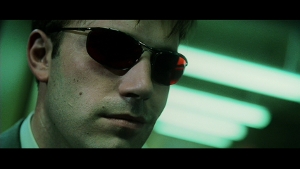
Years later, Matt Murdock is a crusading attorney, seeking justice and hoping to – maybe, someday – expose and ensnare the mysterious Kingpin of Crime (Michael Clark Duncan). You know, the big man at the top of New York’s criminal food chain…a man not-so-incidentally connected to the long-ago murder of Jack “The Devil” Murdock. In service of this, Matt spends his nights jumping about the rooftops of Hell’s Kitchen as Daredevil, tracking down, beating up, and occasionally murdering whomever he can’t convict during normal, John Grisham hours.
This psychopathic-but-interesting status quo’s interrupted by Murdock deciding, completely out of the blue, to hit on a beautiful (or beautifully smelling, anyway) woman named Elektra (Jennifer Garner) in a coffee shop. After she blows him off (twice) Our Hero uses his superpowers to stalk her down the sidewalk for a bit. She takes umbrage and the two have a stiff wire-fu fight on a Hell’s Kitchen playground. In broad daylight. Nice job putting the “secret” in “secret identity,” Matt. After she wins, Elektra chooses to stick around and sooth Matt’s tortured, vigilante soul. So, of course, her father (Erick Avari) is intimately involved with the Kingpin’s dealings, wants out, and must thus be rubbed out by the international super assassin Bullseye (Colin Farrell), a man so deadly he murders people with peanuts and paperclips.
All of which sounds interesting, in theory. It certainly made for great comics. But thanks to that last-minute hatchet job the story doesn’t unfold so much as reconfigure itself. Like Lemarchand’s Box. No matter how you toy with it, Daredevil various configurations always summon up demons who love cranial mutilation almost as much as they love torture.
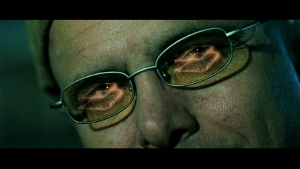
I’m not talking about Ben Affleck’s face here, though that would be the obvious joke. No, I’m going to break with convention and admit I actually liked him in this role more than I like Tobey Maguire’s turn inside the Spider-suit. Affleck’s Daredevil is suitably posable, and I even like the outfit (or the several outfits they tried out over the course filming, and then stapled together, hoping no one would notice how Daredevil’s red keeps changing shades). It’s Affleck’s Matt Murdock I enjoy most. He plays “blind” as well as he plays “driven by vengeance” and superheros are nothing if not driven overachievers. Affleck, Johnson – indeed, the entire film – take good care to immerse us in Matt Murdock’s life, and it’s the little things (a half-smile from Affleck during a court scene, the little braille tags on the sleeves of his suits, the fact that he has to sleep inside a sensory deprivation tank) that cover the most distance, making the first half-hour of this film a fun ride, wonky special effects and all. It’s feels like a peek into some noir sci-fi world…that eventually gave up on both to become a pretentious tragedy.
As fascinating as Murdock’s world is, Daredevil doesn’t idealize its protagonist the way some superhero films did back in the Golden Age of Superhero Movies (Batman, here’s looking at you). Sure, Murdock’s got a boss apartment (especially for New York) but he’s also got more scars on his back than Mel Gibson’s Christ and can’t even get a good night’s sleep without a mouthful of prescription painkillers. Murderous intent aside, Affleck’s Murdock is a nearly-perfect tortured hero. Insane? Hell, yes. But I could honestly summon up feeling for him.
Mostly that’s because I’ve always thought of Daredevil as “the half-Batman.” Think about it: what is Tony Stark but Bruce Wayne, absent an awful tragedy that warped him in his formative years? Much as Jack Murdock’s murder made Matt the Man (Without Fear) he is today. It’s not as if he learned some Great Overriding Lesson from hearing/seeing his father’s heart slow to a stop. There’s no Uncle Ben around to lead Matt in a rousing chorus of “With Great Power Comes Great Responsibility.” In Matt’s world, the overriding moral message seems to be, “Bad things happen to good people for no good reason,” combined with its corollary, “Therefore, good people have to do all they can to stop the bad things from happening.” This is arguably the only lesson powerful enough to propel someone to dress up in a devil costume and use the rooftops of NYC as their own personal gym.
All of which is to say, I’m not a Daredevil fan, but I get it. I also understand why even Daredevil fans despise this film. In the proud tradition of Golden Age superhero movies, it threw a great character under the bus, and to add insult to injury, it did that in the name of being faithful to source material. Once Matt meets Elektra, all bets are off and the film becomes another turgid, superhero soap opera no matter which cut you happen to be watching. I know Matt Murdock’s got his reputation as a “pussy hound” (Kevin Smith’s phrase) to maintain, but I ask you, honestly…would an angst-ridden vigilante psychopath go after the first nice-smelling lady he scented? Would he do so the day after his last girlfriend broke up with him? Over the answering machine? (Dude, burn!) Even for a guy like me, that’s cold. This pursuit of Electra takes “getting back on the horse” to a near-psychotic level. Not that he needs help, what with the casual murdering and all.
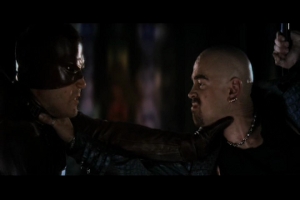
Reputation not withstanding, pussy hunting should come last on any decent vigilante’s To Do list. Especially one so dedicated to “justice” he doesn’t even wait a day before going after the rapist he just failed to convict. Way to maintain a double life, there, genius. How many of Matt Murdock’s failed convictions wind up laterally trisected on the C train line?
And here I thought the Daredevil/Elektra relationship only existed to showcase the “operatic” love that exists between superpowered beings. Instead, it fullfils the same function as the Andrea Beaumont/Bruce Wayne relationship in Mask of the Phantasm: dangling the key to a better life in front of Our Hero’s snarling face…before the movie snatches it away.
Unfortunately, that hijacks what I’d considered to be the main plot of the movie, forgetting all that crap about the Kingpin in the name of having Jennifer Garner and Ben Affleck stare at each other. In the theatrical cut, the best example of this comes fifty-two minutes in, when Elektra persuades Murdock to ignore the screams of his city and have sex. They must’ve worn each other ragged because Murdock sleeps the whole night outside his tank.
I’ll buy that, because if anyone needs to have their brains fucked out it’s this Matt Murdock. Boy’s wound tighter than a warp coil that B’Elanna Torres has had her way with. So tight, in fact, that I don’t even want to buy his sudden abandonment of his mission. (Nor did I want to watch that sex scene.) Not for Garner, not for nothing. I don’t care how she smells: all the information in the film up to this point leads me to believe Murdock would jump right off that roof, even if a whole cheerleading squad of Jennifer Garners asked him to come downstairs. No surprise that, in the director’s cut, that’s exactly what happens. (He leaves, I mean…not the…other thing…wow, that’s a distracting image.)
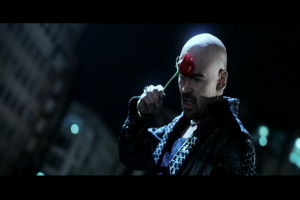
I suppose structural problems are inevitable when you leave a quarter of your film on the cutting room floor, but in either cut the entire back half is far too rushed to be the transcendental, life-altering event the film thinks it depicts. No way the sex was that good. Not that I haven’t had that kind of sex…but let’s just say it took more than two dates for she and I to get there. And it should take more than one fight to bring down the Kingpin. There’s an entire subplot in the director’s cut about Matt and his law partner, Foggy Nelson (Jon Favreau, who’s go on to direct the Iron Man dualogy) bringing the Kingpin down through official channels with, you know, lawful stuff. The theatrical cut completely ignores this in favor of shoehorning Elektra’s origin into the middle of Daredevil’s film, leaving us no time to get to know Elektra. Instead we’re given a rushed, cliff-notes version of her story, simplified to the point of stupidity. Bullseye kills her father in such a way as to implicate Daredevil and, vowing revenge, she almost kills him before a last-minute unmasking shocks and demoralizes her with The Truth…Daredevil is (*gasp*) Matt Murdock! This throws Elektra far enough off her game to allow Bullseye the opportunity to recreate that famous panel from Daredevil #181, the closest thing to an “on-screen” rape/murder mainstream superhero comics had ever seen…at the time.
The comics successfully built up to that moment, avoiding this film’s pitfalls by establishing Elektra as an international assassin/badass with past ties to Matt Murdock long before establishing her ties to the Kingpin or Daredevil. If memory serves, the Kingpin specifically hired Elektra to kill Daredevil, making her identity a revelation for Matt as well, adding depth and shading to his own character by revealing previous unexplored elements of his backstory. As opposed to, you know, having him just walk up to Elektra in a coffee shop and hit on her. Cuz she smells nice. The Power of Love (and red leather) eventually defanged comic book Elektra somewhat and simultaneously earned Bullseye’s obsessive ire, since he obviously wanted to tap that ass too. And at least he’s in Elektra’s line of work. Not that any of this mattered over-much to this movie’s director…or the makers of Elektra’s eventual spin-off film.
There’s nothing wrong with a hot girl who can swing a pair of sais…but does that hot girl have to be Jennifer Garner? Or, if it must be, could she at least have something to do? Other than die tragically? And what are the odds that the children of two Kingpin employees would randomly meet in a coffee shop and fall in love after a date and a half? Makes you wonder about the size of New York City in the Marvel Universe. Sometimes it seems to cover half of North America. Sometimes, it’s the size of Grover’s Corners…only with more muggings. And supervillains.
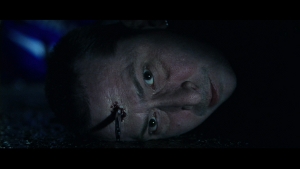
Speaking of which: Michael Clark Duncan’s Kingpin is a joy to behold, playing a cool, rational evil in perfect contrast to Matt Murdock’s flirtation with Death Wish Syndrome. The coolest moments in the film come when Duncan delivers a threat, and I wound up wanting more scenes with him, even with the extra stuff in the director’s cut. The same could be said for Colin Farrell’s Bullseye, who’s as one-note and oily as he needs to be. At least Kingpin’s given some depth and dimension through dialogue. Two dimensions at least. Since he’s the ultimate evil behind all this, that’s almost enough…but it makes Daredevil’s eventual decision to let him live all the more inexplicable.
“I’m not the bad guy,” Murdock insists just before he launches into his outro voiceover, a speech composed of equal-parts fan service and post-9/11 Deification of New York City. Despite the fact that he just threw a man out of a second-story church window, we’re meant to intuit Daredevil’s Learned Something about the difference between justice and vengeance. Unlike your average episode of Batman: The Animated Series, there’s little enough in either cut of this film that might’ve led him to that realization. Guess the sex was just that good. Lucky him.
Daredevil‘s an obvious labor of love that got hacked and slashed at the last minute, almost to incoherence. It didn’t have to be this way. The bones of a good film are here, concealed by fatty layers of annoying pseudo-rock songs and cliched helicopter shots of New York that serve as transitions. Cut those out, introduce Elektra the way Miller himself did, tighten up the focus of the whole film in general, and Daredevil could’ve been the contender Jack Murdock was in his prime.
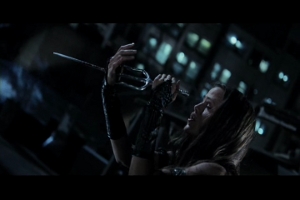
It’s not like Marc Steven Johnson is wrong for this material. Not exactly. His knowledge and love of it is obvious and recognized. Certain shots are drawn straight from Daredevil comics and many of the title’s artists and writers get well-intentioned (if distracting) shout-outs. Frank Miller even gets a cameo as one of Bullseye’s victims, exiting the film with a pen in the head, to my eternal delight.
I can’t think up a better metaphor for the film as a whole: a potentially-brilliant visionary that suffered cataclysmic brain trauma and now drools in the corner and occasionally spazes out whenever the seizures occur. You can’t really blame it for that. I liked it better than X-Men when it came out and still do to this day. It’s barely this side of good…but it makes it there by the skin of its teeth and its inexplicable ability to survive multi-story falls without breaking its ankles.
Honestly though, do yourself a favor and watch the director’s cut. At least you get to see the whole film before you start hating it. It gives Matt Murdock’s excellent (if tragedy-prone) supporting cast time to shine. And both versions take Trial of the Incredible Hulk (Daredevil’s previous live-action appearance) out behind the shed and shoot it. Those who question the veracity of my rating need only look at that film…assuming you dare.
![]()
![]()
![]()
That bad pun is dedicated to Regina, who endured the theatrical cut with me on several occasions throughout the Dark Times of 2003-4.

Ben Affleck as Daredevil… yeah, sorry, I don’t buy this movie. I take The Trial Of The Incredible Hulk and its Daredevil more seriously than this. Jennifer Garner is a blank. Colin Farrell is awful.
The fight scene in the church is really lame. Daredevil and Bullseye never punch each… they just throw things at one another. It’s like watching the Spider-Man Saturday morning cartoon show from the 90’s where they couldn’t punch each other…
Daredevil, no…but Matt Murdock, perhaps. If someone other than Mark Steven Johnson had written the damn thing.